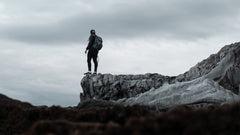
Do This One Thing Every Day
If there’s one thing we could all benefit from doing more of, it’s practising standing on one leg. As we age our balance begins to deteriorate rapidly, and despite it seeming like an unimportant task to master, balancing is actually a sizeable challenge for your body and brain to get to grips with. That's because it requires the coordinated efforts of three different body systems: the eyes, the inner ear and the sensors in the body’s muscular system. Here’s why balancing is a skill we all need to brush up on.
According to researchers of one study, balance begins to decline at around 50; the average time participants of this age were able to stand on one foot was recorded at around 45 seconds, compared to a minute or more for 30-40-year-olds. As the participants got older, the statistics fell sharply again; by the age of 70 participants managed 28 seconds and by age 80 that had more than halved to just 12 seconds. When you factor in that a third of people over 65, and half of people over 80, fall at least once a year, the need for better balance becomes all the more important.
It's not just the risk of falls and injuries that improved balance can help with. Any activities that involve using our balance are important for our brain health because it activates neuroplasticity, which allows the neural pathways in our brain to grow, recalibrate and reorganise. Better balance has also been shown to improve cognitive function, according to one study. In it, researchers asked two groups of participants to undertake either a balance or a relaxation training intervention. After 12 weeks of exercising in this way twice a week, the group assigned the balance intervention had shown significant improvements in memory and spatial cognition.
Although it might feel daunting to add something new into your daily routine, and keep it up, it’s easily done if you think of it like a training ‘snack’. Whether you’re taking a call, waiting for the kettle to boil or watching the news' headlines, factor in your balance exercise during these brief 'pause' moments and you’ll quickly find it becomes second nature, and that you’re able to stand for longer as time goes on. Once you feel comfortable with that, stand on one leg and close your eyes while you’re doing it. Removing your dominant sensors from the equation presents an even bigger challenge for your brain and body, forcing it to work much harder.



